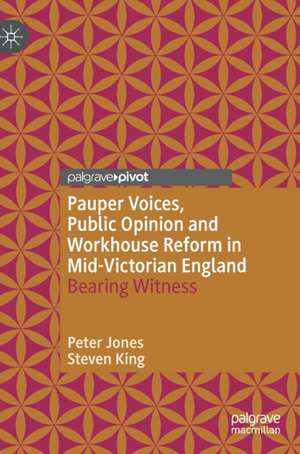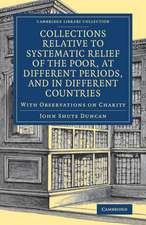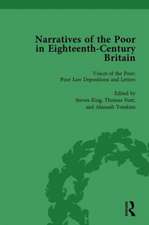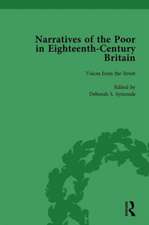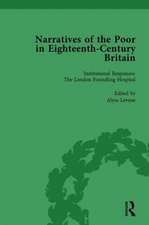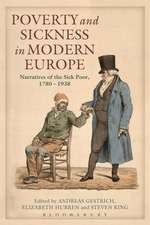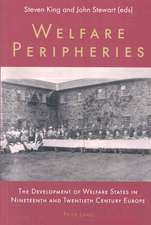Pauper Voices, Public Opinion and Workhouse Reform in Mid-Victorian England: Bearing Witness
Autor Peter Jones, Steven Kingen Limba Engleză Hardback – 9 aug 2020
Preț: 418.45 lei
Nou
Puncte Express: 628
Preț estimativ în valută:
80.10€ • 87.03$ • 67.32£
80.10€ • 87.03$ • 67.32£
Carte tipărită la comandă
Livrare economică 21 aprilie-05 mai
Preluare comenzi: 021 569.72.76
Specificații
ISBN-13: 9783030478384
ISBN-10: 3030478386
Pagini: 136
Ilustrații: IX, 136 p. 1 illus.
Dimensiuni: 148 x 210 x 14 mm
Greutate: 0.35 kg
Ediția:1st ed. 2020
Editura: Springer International Publishing
Colecția Palgrave Macmillan
Locul publicării:Cham, Switzerland
ISBN-10: 3030478386
Pagini: 136
Ilustrații: IX, 136 p. 1 illus.
Dimensiuni: 148 x 210 x 14 mm
Greutate: 0.35 kg
Ediția:1st ed. 2020
Editura: Springer International Publishing
Colecția Palgrave Macmillan
Locul publicării:Cham, Switzerland
Cuprins
1. From Resistance to Reform: Changing Attitudes to the New Poor Law Workhouse in England and Wales.- 2. Not That Joseph Rowntree: An Amateur Workhouse Inspector.- 3. Pauper Letter Writers, Public Opinion, and the Workhouse Experience.- 4. Bearing Witness.
Recenzii
“This book is important for the fresh sources it uncovers, the methods it combines, and its core arguments. … This study suggests many promising paths for further research, and scholars of the Poor Law, poverty, welfare, and the press will find it valuable reading. I think it would also be an excellent book to teach about historiography, historical methods, and, of course, the Poor Law.” (Marjorie Levine-Clark, Victorian Studies, Vol. 64 (4), 2022)
Notă biografică
Peter Jones is a Research Associate at Nottingham Trent University, UK.
Steven King is Professor of Economic and Social History at Nottingham Trent University, UK.
Textul de pe ultima copertă
This book represents the first attempt to identify and describe a workhouse reform ‘movement’ in mid- to late-nineteenth-century England, beyond the obvious candidates of the Workhouse Visiting Society and the voices of popular critics such as Charles Dickens and Florence Nightingale. It is a subject on which the existing workhouse literature is largely silent, and this book therefore fills a considerable gap in our understanding of contemporary attitudes towards institutional welfare. Although many scholars have touched on the more obvious strands of workhouse criticism noted above, few have gone beyond these to explore the possibility that a concerted ‘movement’ existed that sought to place pressure on those with responsibility for workhouse administration, and to influence the trajectory of workhouse policy.
Caracteristici
Fills a considerable gap in our understanding of contemporary attitudes towards institutional welfare Explores the possibility that a concerted ‘movement’ existed that sought to place pressure on those with responsibility for workhouse administration Identifies a workhouse reform ‘movement’ beyond the obvious candidates of the Workhouse Visiting Society and the voices of popular critics such as Charles Dickens and Florence Nightingale
